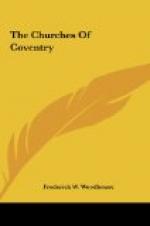Perceye’s chantry again, which Dugdale considered the oldest (though he does not give the date) was endowed in 1350 with six messuages, one shop, six acres of land and 40s. rent, all lying in Coventry, to which in 1407 William Botoner and others, added a messuage and twenty-four acres of land in the city for another priest.
Then the chantry of the Holy Cross (1357) founded for two priests to sing daily a mass for the good estate before death and for the souls after of the royal family, and for the founders and the members of the Fraternity of the Holy Cross, was endowed with seven messuages, fourteen shops and sixteen acres of land in the city.
Dugdale enumerates also four others, Cellet’s, Corpus Christi, Lodynton’s and Allesley’s, to which should probably be added Marler’s, assigned by him to St. Michael’s. The first two are doubtless the same foundation, for in 1329 land and tenements were granted to the priest of Corpus Christi Chapel for the health of the soul of William Celet and others.
It was almost certainly situated in the south transept, on the upper level over the vaulted passage. The position of Lodynton’s chantry (1393) is not known; Allesley’s, founded in the reign of Edward I, was sung at St. Thomas’s altar.
Richard Marler stipulates in his will that his priest is to have the “stypend or wagis of nyne marks by yere so long as he shall be of good and prestly conversacyon and demeanor, wt’ a p’vyso that yf the seyde prest be ffounde otherwyse, after monyc’on and reasonable warnyng to hym geven, he to be removed.”
Much of the later history of the church relates to the destruction of its fittings and furniture or to restorations almost as grievous. In 1560 2_s_. 6_d_. was paid for taking down the carving about the high altar, while the Mayor bought the panelling of the altar for 33_s_. 4_d_., the vail for 5_s_., the “thing that the sacrament was in over the altar 1_s_.,” the “peyre [pair of candlesticks?] that was upon the altar 5_d_.” Perhaps he thought that all these things would be wanted again ere long. In 1547 a quantity of costly vestments and banners had been sold and we find in the accounts a number of such items as these: “Sold the 6 day of Jennery 5 copps of red teyssew to Mr. Roghers, now mayre (and 4 other persons) pryce of the sayd copps, 10_l_. To Bawden Desseld one cope of red velvet, 5_l_. Mr. Schewyll a grene velvet cope, 30_s_.”
But before Mary’s death we have a lengthy inventory of copes, vestments, albs, banners and the like, some of which may have come back to the church from the buyers at the sale eleven years before.
The church must have looked like a builder’s yard in 1643 when the Committee and Council of War pulled down divers houses outside Bishop’s and Spon Gates and stacked the materials here, while the changes of government are indicated by the payment in 1647 of 3_s_. 6 d. “to Hopes for defacing the King’s Arms” and in 1660 of 6_s_. to “Hope for the King’s Arms.”




